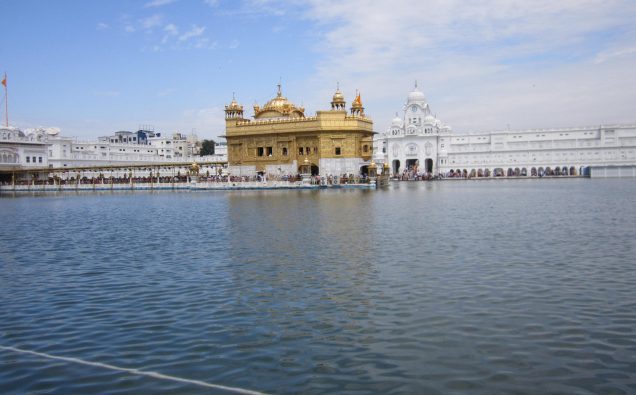
Gold Temple in Amritsar, Photo by Sukanta Pal via Wikimedia Commons
Narendra Modi, India’s prime minister, faces a peace test this weekend when Pakistan will make a bold move to attend the Heart of Asia conference – a multilateral Afghanistan-focused forum- amid blistering Kashmir tensions between the two nuclear-armed neighbors.
Being host of the conference, the onus lies on Modi if he would respond to Pakistan’s offer to hold a dialogue in order to ratchet down tensions that hurt both countries at a time when their economies are doing better than in the recent past but both face threat of terrorism and a dangerous standoff over Kashmir.
Islamabad this week announced that it would not follow India’s recent example of sabotaging a SAARC meeting, which was to be held in Islamabad but which Pakistan had to postpone after New Delhi pulled out, and its top foreign affairs adviser Sartaj Aziz would participate in the Heart of Asia conference.
The conference to be held in border city of Amritsar on Sunday will deal with the question of peace in Afghanistan but the moot takes place amid a diplomatic impasse between India and Pakistan.
South Asian tensions have been raging over issues including repression of Kashmirs in Indian-controlled part of the disputed territory, skirmishes along the Line of Control, terrorism, and water issues. Indian killing and maiming of Kashmiri civilians and a militant attack on Indian military base in Uri – which India alleged to be a case of cross-border militancy- escalated tensions between the two neighbors.
Modi, who has allowed use of pellet guns on civilian Kashmiris and heavy shelling across the Line of Control into Pakistan-administered Kashmir, will have to overcome two issues.
First, he will have to give up the old Indian tactic of exacerbating tensions with Pakistan, whenever there is unrest in Kashmir as the world focus on terrible conditions in the Indian-controlled part would draw world calls for resolution of the issue.
Secondly, Modi will have to restrain the BJP leaders who follow an extremist mindset to dominate the country with Hindutva ideology and want nothing but a complete Indian hegemony in the region.
But India and Pakistan, both being democracies, must create an environment that helps defeat militant mindset in the two countries.
While India’s repression in Kashmir has exposed its horrible disregard for human rights to the world, Pakistan too faces a dangerous situation in which it might have to divert its attention from the high-cost war against terror on the Afghan border to its eastern border with India. Any return of terror outfits like TTP would fuel militant mindset and deeply harm prospects for its economic progress.
Secondly, Pakistan and India both have an opportunity to benefit from completion of $ 46 billion China Pakistan Economic Corridor which will provide key trade and energy routes. Some Indian analysts and officials have indicated that CPEC lies at the heart of Indian aggressive moves against Pakistan including New Delhi’s support for insurgency in Balochistan.Clearly, the two countries cannot afford to lose themselves in a cycle of violence and war of proxies as suggested by Ajit Doval and other BJP leaders of Modi’s party, who hold extremist views and believe in having a hawkish line on India-Pakistan relations.
Once the two countries resume peace talks, the restoration of people-to-people contacts like exchange of trade delegations, film and music collaborations, would certainly create an environment toward finding peaceful resolutions to their troubles.
On Friday, Prime Minister Nawaz Sharif’s government reiterated its call for bilateral talks with India but at the same time the country’s High Commissioner in New Delhi, Abdul Basit said Islamabad is “not begging for dialogue. If India is not ready, we can always wait.”
“There is a need to break the impasse between the two countries, Basit The Hindu newspaper on Friday.
“Talking to each other is inevitable. Whether it happens one year down the road or three years down the road,” the Pakistani envoy asserted.
Basit also said Pakistan remains open to “any proposal for talks from the Indian side,” adding that during the conference, attention must remain on Afghanistan.
“Whether or not there are bilateral talks, our adviser is coming because Afghanistan is important for us, its stability and economy are important for us so we will participate constructively,” Basit said.
Indian Foreign Office spokesman Vikas Swarup, however, ruled out any possibility of talks with Pakistan on the sidelines of the up-coming conference a day earlier.
“Talks cannot happen in a climate of continued terrorism. India will never accept continued terrorism as the new normal of the bilateral relationship,” Times of India quoted Swarup as saying during a weekly press briefing.
Basit responded by saying that Pakistan had no such concerns as terrorism is an important issue for the country as well.
“Why should we worry because terrorism is also an important issue for us.”
“There is zero tolerance for terrorism in Pakistan,” Basit added. He highlighted that in the past Pakistan has taken action against “proscribed” militant groups such as Jaish-i-Mohammed and Lashkar-i-Taiba.
In regard to the escalating situation along the Line of Control (LoC), Basit said, “the 2003 ceasefire was an important Confidence Building Measure,” which should remain intact.
“We must preserve it and then consolidate.”
Meanwhile, Pakistan has reminded India of its obligations under the Indus Waters Treaty (IWT) and cautioned that New Delhi’s own credibility would suffer if the accord was violated.
“India has to abide by its international obligations, if it wants to be taken seriously by the international community,” Foreign Office spokesman Nafees Zakaria said.
He was commenting on Indian Prime Minister Modi’s threatening statement last week in which he had declared that the water that “rightfully belongs to India” under the Indus Waters Treaty and could not be allowed to go to Pakistan.





![South Asia UN Map [Public domain], via Wikimedia Commons](https://www.viewsnews.net/wp-content/uploads/2016/12/South_Asia_UN-845x1024.png)








